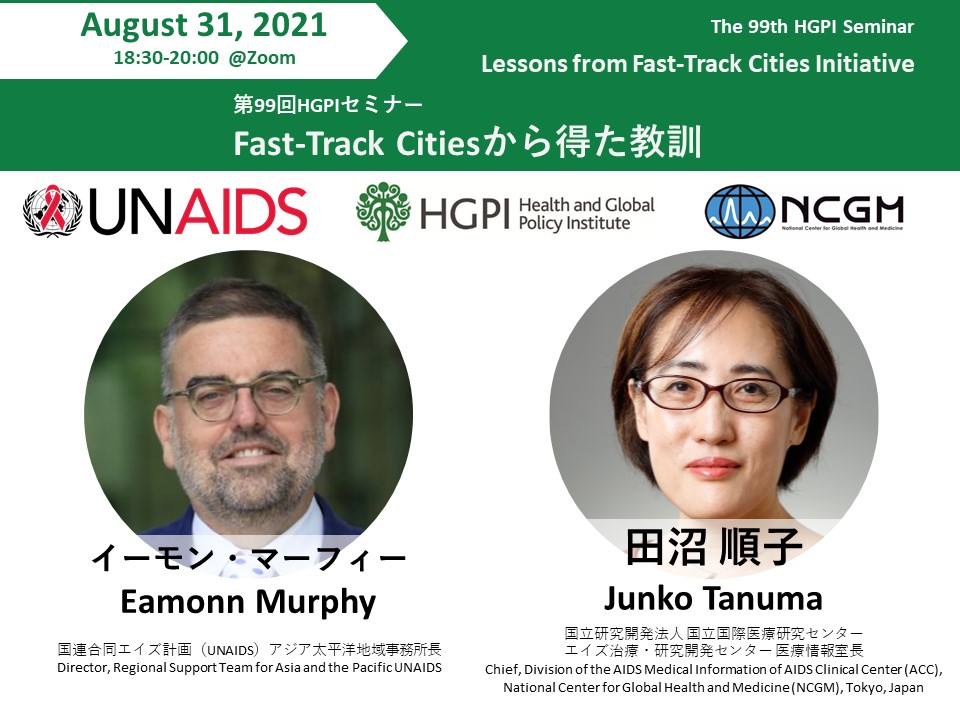This webinar will be convened under the HGPI and UNAIDS Memorandum of Understanding (MOU) which signifies the organizations’ commitment to enhance dialogue and combine their efforts to achieve the common goal of ending the HIV/AIDS epidemic in the Asia and Pacific region.
In 1981, the first case of AIDS was reported in the United States. While there is still much progress to be made, decades of research and public health interventions have led to an overall reduction in new HIV infections. Forty years later, the world is facing a new challenge—the COVID-19 pandemic—which has seriously affected the world’s most vulnerable communities and is threatening decades of progress in HIV epidemic control by disrupting health systems and health delivery. At the same time, the global health community has been able to utilize its decades of experience tackling HIV worldwide to address COVID-19. This experience has helped countries grappling with COVID-19 ensure a more robust response to both pandemics using the existing infrastructure and lessons learned from HIV. Additionally, many health systems in regions with a high HIV burden are fragile and COVID-19 has exposed several underlying weaknesses forcing countries to adapt and accelerate the scale-up of service delivery.
At the United Nations General Assembly High-Level Meeting on AIDS that took place from 8 to 10 June 2021, member states adopted a set of new targets aiming at ending the AIDS epidemic by 2030. The political declaration calls on member states to provide people-centered and effective HIV combination prevention options. It also calls for greater awareness of disease prevalence and care and aims to ensure that 95% of people living with HIV know their status, 95% of people who know their status be on HIV treatment, and 95% of people on HIV treatment be virally suppressed. By achieving these goals, 3.6 million new HIV infections and 1.7 million AIDS-related deaths will be prevented by 2030.
In Japan, there is a higher prevalence of HIV in urban areas such as Tokyo and Osaka, especially among young men who have sex with men. Overall, there has been a slight decrease in the number of reported cases of HIV, but there are still some regions where cases have been increasing. For that reason, HIV epidemic control efforts must be localized to reflect the trends and incidence of people living with HIV and AIDS in each region.
The Fast-Track Cities Network was established in recognition that cities must play a critical role in delivering on the goal of ending AIDS by 2030. As seen domestically in Tokyo and Osaka, HIV infection is often higher in urban areas due to factors such as social networking, migration, unemployment, and social and economic inequalities. Nevertheless, cities have historically taken a leading role in the HIV/AIDS response. The Fast-Track Cities Network supports cities in fast-tracking their HIV responses and to deliver on the goal of ending AIDS.
For this 99th HGPI Seminar, Health and Global Policy Institute will invite speakers to discuss strategies for ending AIDS by 2030, as well as lessons that UNAIDS learned from combatting HIV/AIDS and how they can be applied to the COVID-19 crisis. Furthermore, a Japanese expert will explain the current situation surrounding HIV/AIDS in Japan and what can be done to address HIV infections in line with the Fast-Track Cities initiative.
Speaker:
Mr. Eamonn Murphy (Director, Regional Support Team for Asia and the Pacific UNAIDS)
Dr. Junko Tanuma (Chief, Division of the AIDS Medical Information of AIDS Clinical Center (ACC), National Center for Global Health and Medicine (NCGM), Tokyo, Japan)
Date and time:Tuesday, August 31, 2021, from 18:30-20:00 JST / 16:30-18:00 (Bangkok) / 11:30-13:00 (Geneva)
Venue:Zoom webinar
Participation fee:Free
Capacity:500
Organizer:Health and Global Policy Institute



